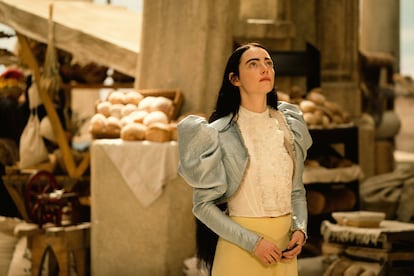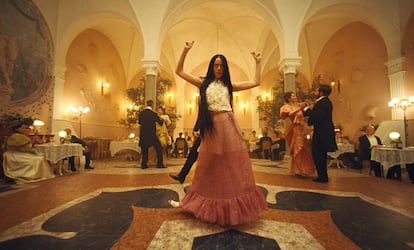Bella Baxter, the nympho Barbie antithesis is the feminist we all needed
The ‘Poor Things’ character played by Emma Stone challenges the hoary dumb-blonde stereotype through a fresh take on sex addiction

Bella Baxter is destined to be one of those characters who elicits both adoration and animosity, igniting fierce cultural debates with her strong feminist stance. The protagonist of Poor Things has no filter and does what she wants with her body. Emma Stone’s character in Yorgos Lanthimos’ film stands in stark juxtaposition to Barbie.
Belle is a toy who one day awakens to her human-like abilities. She’s a joyful and quirky young creature reminiscent of Frankenstein’s creation, embarking on a journey akin to Pinocchio or Dorothy in The Wizard of Oz. Well on her way to becoming feminist (character) of the year, Bella debunks the dumb-blonde stereotype with her intriguing twist on one that’s much more interesting — the wild nymphomaniac.

Moviegoers will also debate whether Lanthimos’ film truly achieves the shock value it aims for or if it leans more towards a romantically dark Gothic narrative. The film’s elaborate and lavish style have won it a Golden Lion at the Venice Film Festival and garnered 11 Academy Award nominations, include one for Best Actress. Bella’s father, Dr. Godwin Baxter (played by Willem Dafoe), brings to life his creation by implanting the brain of one woman in the body of another. This is the key to Bella’s innocence. She represents an abused woman with a chance for a fresh start, liberated from the societal constraints that have nearly destroyed her.
The movie is a close adaptation of Alasdair Gray’s 1992 novel of the same name, and is the second collaboration between Stone and Lanthimos after The Favourite. Like Margot Robbie with Barbie, Stone is one of the producers of Poor Things, a film that showcases her acting chops. While Bella’s physical movements may at times resemble Barbie’s stiff smile, they somehow have the same unconventional charm as John Galliano’s latest Margiela fashion show. Stone embraces Mary Shelley’s mythological tale and emerges as a powerful symbol of female nonconformity, a stunningly dressed little monster full of life and lust.
Sign up for our weekly newsletter to get more English-language news coverage from EL PAÍS USA Edition
Tu suscripción se está usando en otro dispositivo
¿Quieres añadir otro usuario a tu suscripción?
Si continúas leyendo en este dispositivo, no se podrá leer en el otro.
FlechaTu suscripción se está usando en otro dispositivo y solo puedes acceder a EL PAÍS desde un dispositivo a la vez.
Si quieres compartir tu cuenta, cambia tu suscripción a la modalidad Premium, así podrás añadir otro usuario. Cada uno accederá con su propia cuenta de email, lo que os permitirá personalizar vuestra experiencia en EL PAÍS.
¿Tienes una suscripción de empresa? Accede aquí para contratar más cuentas.
En el caso de no saber quién está usando tu cuenta, te recomendamos cambiar tu contraseña aquí.
Si decides continuar compartiendo tu cuenta, este mensaje se mostrará en tu dispositivo y en el de la otra persona que está usando tu cuenta de forma indefinida, afectando a tu experiencia de lectura. Puedes consultar aquí los términos y condiciones de la suscripción digital.









































